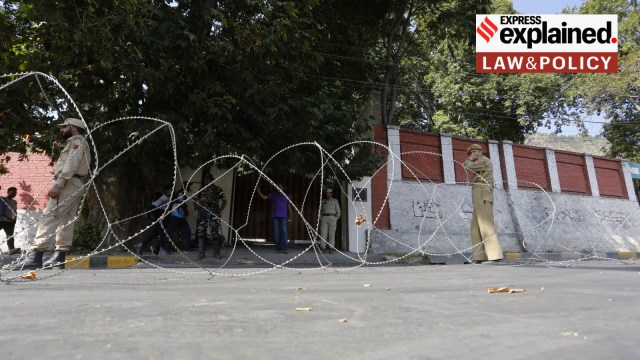Why ‘application of mind’ (by the DM) is crucial for preventive detention under the J&K Public Safety Act
Despite the stringent provisions for preventive detention under the Jammu and Kashmir Public Safety Act, Justice Rahul Bharti quashed an order against a certain Jaffar Ahmad Parray. Here is why.
 After the abrogation of Article 370, J&K leaders such as Farooq Abdullah were placed in preventive detention under PSA. Here is a photo of his house, where he was detained. (Express Photo by Shuaib Masoodi.)
After the abrogation of Article 370, J&K leaders such as Farooq Abdullah were placed in preventive detention under PSA. Here is a photo of his house, where he was detained. (Express Photo by Shuaib Masoodi.)The Jammu and Kashmir High Court, on March 22, ordered the release of Jaffar Ahmad Parray, who was detained in May 2023 under the state’s Public Safety Act, 1978 (PSA).
Parray was placed in preventive detention under orders of the Shopian District Magistrate (DM), after the police reached out to him and accused Parray of being an Over Ground Worker (OGW) for terrorist groups Lashkar-e-Taiba and Hizbul Mujahideen.
Despite the stringent provisions for preventive detention under the PSA, Justice Rahul Bharti held that Parray’s preventive detention was illegal, and quashed his detention order. Here is why.
But first, what is the law on preventive detention?
Chapter IV of the PSA titled “Power to make orders detaining certain persons” is by far the most comprehensive part of the legislation.
The entire chapter hinges on Section 8(1)(a) which allows the government to detain individuals to prevent them from “acting in any manner prejudicial to the security of the State or the maintenance of public order”. Crucially, this allows the government to detain individuals who they believe could cause harm in the future, even though they may not have committed any crimes at the time of detention.
Under Section 8(2), the DM is empowered to pass an order to detain any person if they are satisfied that the person falls under the condition provided in Section 8(1)(a). The Magistrate must then report the detention order to the government for approval, without which the order will lapse after twelve days. However, it is rare for such approval not to be granted.
Section 10-A of the PSA, which was inserted via an amendment in 1985, states that detention orders cannot be deemed invalid or inoperative “merely” because the grounds of detention are vague, non-existent, not relevant, not connected with the detained person, or “invalid for any other reasons whatsoever”.
One of the few avenues available to persons detained under the PSA are explained in Section 13(1) which requires the DM to disclose the grounds for detention to the person detained within five days of issuing the order (although this may be extended to 10 days, in “exceptional circumstances”). It also states that the person detained shall be given “the earliest opportunity” to make a representation against the detention order.
Section 13(2), however, states that the DM is not required to disclose facts “which it considers to be against the public interest to disclose.”
On what grounds was the order against Parray quashed?
Justice Bharti in his judgement noted that the grounds for detention under Section 8(1)(a) of the act, recorded by the District Magistrate, were a “verbatim reproduction” of the police dossier, which itself did not contain “even a single line reference about the petitioner being involved in a case registered under some FIR with any Police Station”.
Moreover, on the subject of representation under Section 13, he noted “Representation against a preventive detention once submitted by a detenu is not meant to be a routine piece of paper at the office table of the PA of the District Magistrate”.
Justice Bharti held that there must be “application of mind” from the DM who is faced with such a representation, and observed that “In the present case, the petitioner did not get the solace of fact that his representation was even read lest considered by the concerned authority.”
Though the nature of preventive detention does not require the detained person to have committed any crimes, Justice Bharti noted that the police interrogated Parray. This interrogation allegedly revealed that he was an OGW for the two terrorist organisations, leading to the detention order.
From this, Bharti conducted an exercise in deduction, and concluded that the police had picked up Parray and interrogated him without registering a criminal case against him, or even noting any past criminal activities.
“Thus, the very root of the petitioner’s preventive detention is illegal and coercive”, Justice Bharti held. Considering these factors together — the lack of application of mind by the District Magistrate and the actions of the police — he held that the preventive detention was illegal and quashed the detention order.
How have High Courts, and the Supreme Court previously on the matter?
The issue of DM’s non-application of mind when issuing detention orders under the PSA has come up in the recent past at the J&K High Court.
In August 2020, in the case of Surinder Singh v. Union Territory of Jammu and Kashmir, Justice Puneet Gupta quashed a detention order against an alleged “history-sheeter” (someone who has been implicated in multiple chargesheets in the past). He noted that the detention order “is more or less copy-paste of the dossier” sent by the police to the DM.
Coupled with the fact that the police dossier failed to mention that the detained person had been acquitted or received bail in most of the past cases against him, the judge held that the detention order “shows the non-application of mind” of the police and the Magistrate, and quashed the order.
The Supreme Court, in a number of decisions in the years following the enactment of the PSA, delivered similar decisions on non-application of mind. Justice Chinnappa Reddy, in two separate decisions on January 24, 1985, directed the release of petitioners who had been detained under the PSA.
In the first case, he found that in the detention order “word for word the police dossier is repeated” and there was no mention that the petitioner was already in custody. In the second case, he found that the past detention order had been revoked without any reasons provided and the fresh detention order made no mention of this revoked order, and held “we can only conclude that the orders of detention were made in a mechanical fashion without application of mind.”
In Vijay Kumar v State of J&K (1982), the DM-issued an order of preventive detention against someone who was already in jail and made no note of that fact in the order. In such situations, the court held that there must be “compelling reasons” for a detention order, the lack of which “clearly exhibits non-application of mind and would result in invalidation of the order”.
- 01
- 02
- 03
- 04
- 05






































